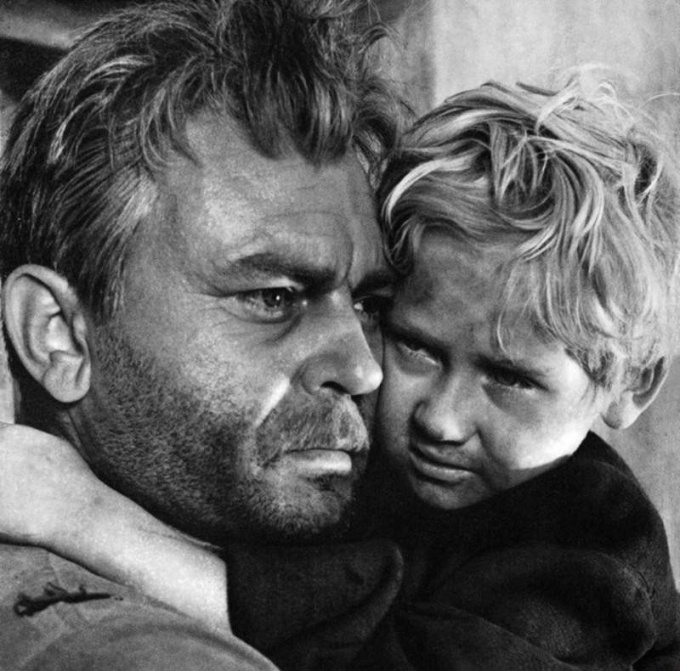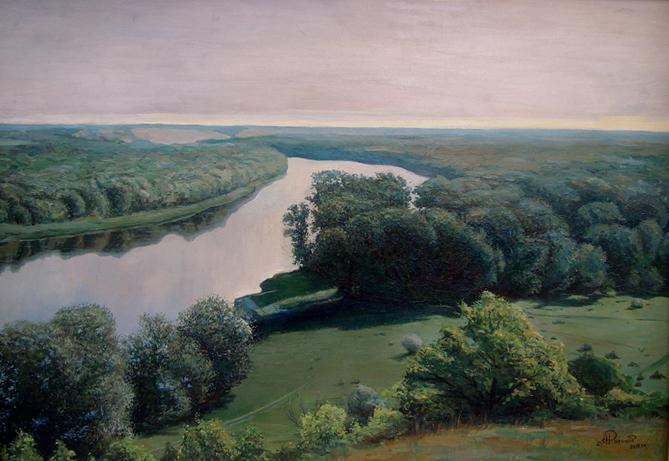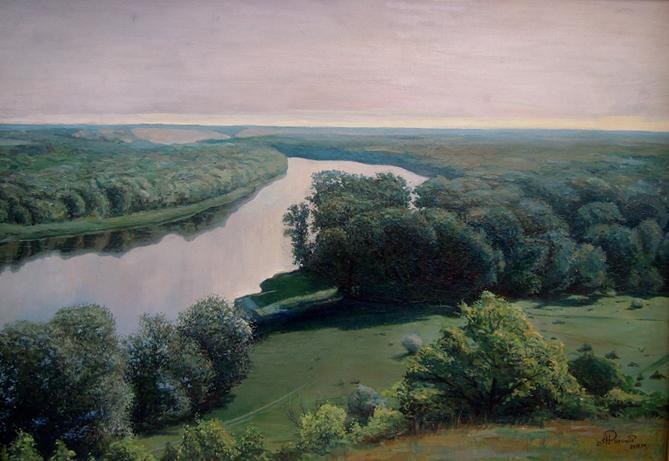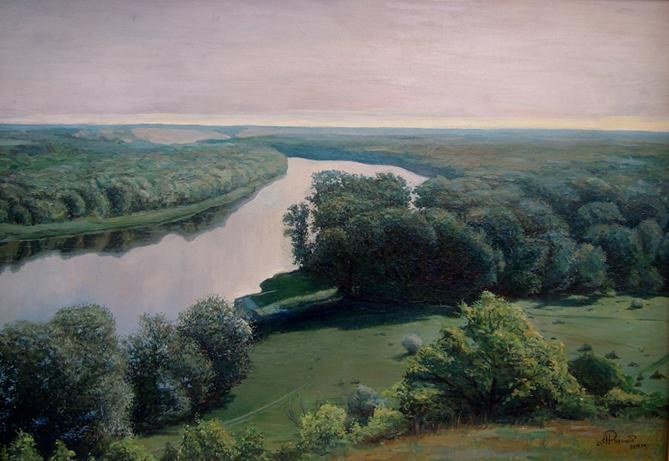Tip 1: The story of Sholokhov's story "The Fate of Man"
Tip 1: The story of Sholokhov's story "The Fate of Man"
The story "The Fate of Man" was first publishedin the newspaper Pravda at the turn of 1956-57. Mikhail Sholokhov wrote the story quickly, literally in a matter of days. However, the idea of the story matured for a long time, about ten years.

Meeting on the hunt
The story of the creation of the story "The Fate of Man"told the journalist M. Kokta in the essay "In the village of Veshenskaya". In particular, the journalist wrote that with the prototype of the protagonist Mikhail Alexandrovich Sholokhov met on the hunt. It was near the farm Mokhovsky. Here Sholokhov came to hunt wild geese and geese. After sitting down to rest after hunting near the steppe river Elanka, the writer saw a man and a boy walking to the river crossing. Travelers took Sholokhov for "his brother-driver." In the ensuing casual conversation the traveler told about his fate. The story greatly excited the writer. Mikhail Alexandrovich was so shocked that he even forgot to ask the name of his casual acquaintance, which he regretted later. "I must certainly write a story about this," Sholokhov repeated. Ten years later, Sholokhov read the stories of Hemingway, Remarque, and other foreign artists of the pen. They painted a man doomed, powerless. Before the writer's eyes, that unforgettable meeting at the river crossing again arose. A long-awaited idea received a new impetus. Seven days Sholokhov almost never left the desk. On the eighth day the story was over.Responses to the story
The story "The Fate of Man" was published in the newspaper"Pravda", in the numbers of December 31, 1956 and January 1, 1957. Soon he was read by the All-Union Radio. The text was read by a popular film actor of those years, Sergei Vladimirovich Lukyanov. The story immediately found a tip in the hearts of listeners. According to the memoirs of the writer Yefim Permitin, who was staying with Sholokhov in the village of Veshenskaya, after the broadcasts on the radio, Sholokhov's desk was literally filled with letters coming from all over the country. They wrote to him workers and collective farmers, doctors and teachers, Soviet and foreign writers. Came letters from people, like the protagonist of the story, survived the fascist captivity and the families of the war veterans who died. Neither the author himself nor his assistants were physically able to answer even the meager part of the letters. Soon, Yuri Lukin and Fyodor Shakhmagonov wrote, based on the story "The Fate of Man", a screenplay that was published in the Literary Gazette in November 1957. The film under this scenario was directed by Sergei Bondarchuk, who played the main role in it. The film went to the screen in 1959. He collected numerous prizes at domestic and international festivals.Tip 2: Summary "The Fate of Man" by M. Sholokhov
Small in volume, but surprisingly capacious in terms ofthe story of M. Sholokhov, telling about the fate of not only a simple Russian man, Andrei Sokolov, but also about the fate of the whole country. After all, the hero of the story is the same age as the century.

The story begins with the author's story about an accidentalacquaintance with a middle-aged man and his young son. They had several hours to wait, and they decided to pass the time for conversation. So the author learned about the life of this seemingly ordinary person. But there was something attractive in this nepremetnosti, and most importantly - in the eyes that saw a lot ...
The beginning of the life of Andrei Sokolov
Andrey was born in 1900, in Voronezhprovince, in a peasant family. The most common childhood ended with the onset of global changes in the country and in the world. Civil war, the death of the whole family in a hungry year ... It was unbearable to stay in a deserted village, without a single native person nearby. In the early twenties the young man moved to Voronezh, entered the plant.Pre-war life
So, apparently, the happiest period beganin the life of the hero. His main success is a happy marriage to Irina, also a lonely girl, a round orphan, who happened to see many griefs. Irina was not just a beloved woman, but also a really good wife - intelligent, caring and understanding. Soon the children, the son and two daughters were born. In 1929, Andrei decided to change his specialty - he learned and became a chauffeur. Paternity, the recognition of yourself as the head of the family, responsibility for your loved ones, pride in your son, a capable youth, joy for your daughters - could you be happier! But the war began ...War, captivity, wreck of life
At the front Andrew was called at the very beginning of the war. Farewell to the family was unbearably heavy, Irina could not calm down for a minute, she was sure that she would never see her husband again. Unable to endure her tears, Andrei said farewell to his beloved colder than it should have been ... This was a heavy burden for the rest of his life. At the front, Andrew was also a chauffeur, he drove ammunition to the front line. Once I did not take it - the projectile fell next to the car, he lost consciousness and was captured. The horror of bondage, the dream of liberation from captivity, of escape began. But the first attempt failed and almost cost Andrei life, but did not extinguish the desire for freedom. The next attempt was more deliberate and was crowned with success - the hero got to his own! And, of course, the first thing I tried was to find out about the fate of my relatives. For more than two years, he knew nothing about his wife and children. But what happened to know, could not be horrified ... His wife and daughters were killed - a bomb hit their house. Only the son remained alive. Learning about this, Andrei went to the front as a volunteer, and all the hope was only to meet with his son. He found Anatoly, they corresponded, their meeting was already close ... His son was killed on May 9, 1945.Life after the war
Again lonely, who lost everything, Andrei Sokolovdemobilized. To go to Voronezh, where everything was reminiscent of the past happiness, there was no strength, and he went to Uryupinsk, to a front-line friend. I got a job as a chauffeur, hoping to somehow live my life. And fate gave him another meeting - with a small homeless orphan Vanya, who became his son. The heart can not be lonely, a person can not but want happiness. And Andrei Sokolov, crippled by the war, destitute of fate, decided to make this little man happy. His troubles did not end there. At the moment when the author meets with his hero, Andrei, because of the chance of losing his job, goes to Kashira, hoping to get settled there. But not only the turmoil drives Sokolov from place to place ... Tosca, an angst for the past does not allow to settle in one place. But there is also hope - for the sake of the boy to settle, to take roots, to live not only the past, but also the expectation of the future.Tip 3: How to write an essay on the novel "Quiet Flows the Don" by Sholokhov
In school, the work "Quiet Flows the Don" is usually studied in11 class in the course of literature of the twentieth century. The study of this topic usually ends with the writing of a composition, home or in class. A few useful tips will help you successfully cope with this work.

Instructions
1
A school essay is not a literary article inminiature. The purpose of the essay is to understand how the schoolboy feels the work, how he can think, what conclusions to make, and how well he learned the theoretical course of literature and information about this author and work. Themes for essays are very different, but, as a rule, for writing, the teacher chooses a topic that you did not have time to complete in the course of studying this work. Therefore, here are a few rules for writing any composition, including the "Silent Don".
2
1) The work must be read. True, schoolchildren often practice writing essays on works that have only been heard in snatches at lessons or read in brief. Moreover, such compositions sometimes turn out to be quite successful. However, an experienced teacher will always distinguish a thoughtful composition from a superficial one, even if it does not point the student to it.2) It is necessary to strictly follow the theme of the composition. Retreats are possible, but the essay written on a completely different topic is unlikely to be highly appreciated. 3) Do not get carried away by quoting. Quotes are needed to confirm the text of your judgments, but do not make them an essay. 4) Use theory, historical information and facts about the author and the work.
3
Now a little about the specifics of the work "QuietDon". This work is a novel-epic, and is seen in school from several basic points of view. First, it is the theme of the war and how it affects the fate of the people. Secondly, the theme of the Cossacks as a very special community and way of life. Thirdly, it is the fate of an individual, his character and qualities. If it is a question of war or about the Cossacks, it is absolutely necessary to study any materials on this topic in order to be savvy in these issues and be able to correctly construct the argument.
4
In the work on "The Quiet Don"say about the unique language of Sholokhov. In many respects, the artistic originality of the novel depends on it. There is a lot of dialectal vocabulary in the language, vernacular. It is so much so that it is sometimes difficult for a modern man to understand without a dictionary what is at stake. So Sholokhov tried to immerse the reader in the world of the work.
5
Remember the main components of composition composition - the introduction, the main part and the conclusion. Build a logical chain of reasoning, confirm all your thoughts with text.
6
Use in the composition all that the teacher gaveat the lesson, reread your entries. Perhaps this is not too correct, but most teachers like it when the essays they dictated in the classroom appear in the essays.
7
Use ready-made essays on "The QuietDon "can, but do not betray them for their own. First, you can get into an uncomfortable situation, and secondly, teachers are often familiar with the texts of the finished works. It is better to use them to find interesting ideas and turns.







